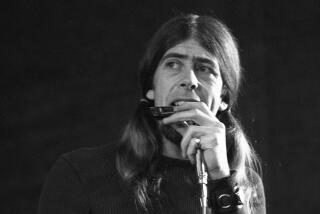David ‘Honeyboy’ Edwards dies at 96; Chicago bluesman
David “Honeyboy” Edwards, the son of a sharecropper, the grandson of a slave and — for an extraordinary 80-plus years — the voice of the Delta blues, died Monday at his home in Chicago, said his longtime manager, Michael Frank. He was 96 and had been in declining health with heart problems.
Edwards picked cotton and pulled corn on Mississippi Delta plantations from age 9, living the hard life that the blues were created to address. As a young man, he hoboed across the South with a guitar on his shoulder, rode the rails, got thrown in prison for vagrancy and on various trumped-up charges and, along the way, made music with the founders of the art form: Robert Johnson, Charlie Patton, Son House, Tommy McLennan, Sonny Boy Williamson and Big Joe Williams.
“Honeyboy — that’s the end of the line,” said veteran Chicago blues musician Billy Branch, who recorded and performed with Edwards. “He’s the last of the bluesmen from his generation. He was that direct connection with the fabled Robert Johnson, and with [Edwards’ death] it is the end of that particular style.”
Said Bruce Iglauer, president of the Chicago blues label Alligator Records, “Honeyboy was one of the very last links to the real world of the Delta blues, a crucial world in the development of American popular music. He was a truth teller.
“He understood that this music can’t be separated from the culture in which he was born and grew up. It can’t be separated from the reality of the racial situation in the South at that time, and what black people were and weren’t allowed to do.”
To listen to Edwards’ soft-but-searing tenor and cut-to-the-bone guitar playing was to hear the field hollers and laments, the work songs and hymns of a black underclass and, equally important, to hear that music performed as it was roughly a century ago.
“I always considered him a walking jukebox of the blues from the ‘30s through the ‘50s — he just had so much music stored up in that memory of his,” said Frank, who worked with Edwards for 39 years.
Edwards told his remarkable story in a memoir that has become a landmark of American musical history, “The World Don’t Owe Me Nothing: The Life and Times of Delta Bluesman Honeyboy Edwards.” The musician detailed the brutality of life on the plantations around Shaw, Miss., where he was born June 28, 1915. He told of lynchings that dotted the landscape and of the hardships of being picked up and sent to the penitentiary for being in the wrong place at the wrong time.
But he also spoke eloquently of how blues music gave outlet to the pain experienced by those who created it, heard it and needed it.
“You could play the blues like it was a lonesome thing — it was a feeling,” he said in a 1997 interview with the Chicago Tribune. “The blues is nothing but a story.... The verses which are sung in the blues is a true story, what people are doing … what they all went through. It’s not just a song, see?”
Edwards first picked up a Sears Roebuck guitar at age 12 and was working as a musician by 14. Though he collaborated prolifically with the first-generation creators of the music, he was perhaps most famous as one of the last musicians to visit Robert Johnson as the seminal bluesman lay dying in Greenwood, Miss., in 1938.
Along with a generation of blues musicians and others during the Great Migration, Edwards traveled north to Chicago in the mid-1950s to get work. He toiled in factories as a machine operator and on construction sites as a laborer. At night, he played the blues.
He recorded for Chess Records, the primary Chicago label of the day, but he never attained a fraction of the fame of Muddy Waters, Willie Dixon or his other blues contemporaries.
The rediscovery of the blues in the 1960s, in the wake of the British rock ‘n’ roll invasion, made Edwards a desired performer on stages around the world, and he performed steadily nearly through the end of his life. He last performed in April in Clarksdale, Miss.
Edwards won a Grammy Award in 2007 for best traditional blues album with “Last of the Great Mississippi Delta Bluesmen: Live In Dallas” and was honored with another Grammy last year for lifetime achievement.
Survivors include a daughter, Betty Washington, and her children and grandchildren; and a stepdaughter, Dolly McGinister.
More to Read
Start your day right
Sign up for Essential California for the L.A. Times biggest news, features and recommendations in your inbox six days a week.
You may occasionally receive promotional content from the Los Angeles Times.




















































